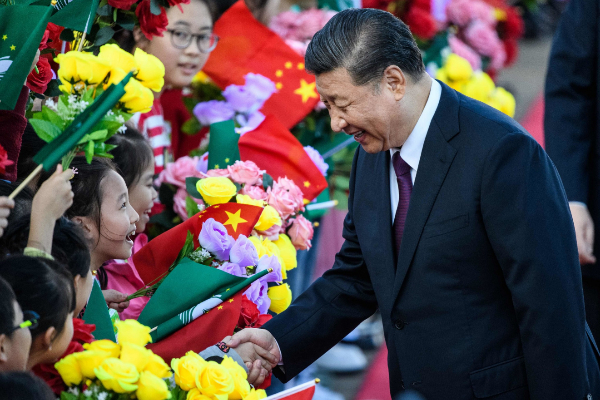- Asia: Protesters return to take the streets of Hong Kong after six months of protests
- Such a day as today.Porgual, the regime that fell under the weight of flowers
In an mundane meadow in the Lisbon neighborhood of Encarnação is the equestrian statue of João Maria Ferreira do Amaral, the governor of the Portuguese colony of Macao who was killed by a mass of enraged subjects in 1849.
Originally the monument - which portrays the commander just before his death in machetes , with his staff raised to keep the natives away - did not rise in this working area of the Portuguese capital, but in that distant colonial territory, where it was installed in 1940 by order of the dictator António de Oliveira Salazar. The president wanted to reaffirm the Portuguese dominance over Macao and hoped that the bronze figure would keep a watchful eye on the Asian inhabitants for eternity.
In the end the statue lasted just over 50 years in its original location; In 1992 it was dismantled and sent back to Lisbon. That trip was the prelude to a major exodus: the one that occurred on December 20, 1999, when the People's Republic of China regained control of Macau and the Portuguese colonial leaders withdrew, who had to hand over that last vestige of the Empire Portuguese.
The Portuguese navigators settled in Macau at the beginning of the 16th century and agreed to pay tribute to the Chinese authorities to maintain that trading post in the Pearl River Delta.
Unlike the British, the Portuguese did not use violence and accepted the sovereignty of Beijing until the 19th century, when it was decided to take advantage of China's weakness to impose a treaty in which the administration of the territory was ceded to Portugal.
That colonial status was maintained until 1949, when the new People's Republic began to demand the return of Macao , something inconceivable to Salazar, who felt both appreciation for the Portuguese Empire and hatred of communist regimes. The issue was parked until the Carnation Revolution occurred in 1975. At that time Macao was a deficit colony, and for that reason when the new Portuguese authorities met with their Chinese counterparts, they did not hesitate to offer to do what they did with that territory. same as it had done with the Portuguese possessions in Africa: evacuate it, without more.
To the surprise of the Portuguese, the Chinese rejected that option: they did not want to regain control over the colony with dying Mao Zedong. The situation was not resolved until 1987, when a transition similar to that agreed for the withdrawal of the British from Hong Kong was agreed, and Beijing undertook to apply the subsequent policy of "one country, two systems" until 2049 to guarantee freedom of expression, meeting and religion in Macau.
As a token of gratitude to the Portuguese for their patience and good faith in the negotiations, Beijing agreed that "the delivery" would take place in 1999 - a year and a half after the departure of the British from Hong Kong - so that the Portuguese could boast having been the first Europeans to settle in Asia and be the last to retire.
Thus, that icy night of just 20 years ago, the Sino-Uruguayan authorities met to attend a concert starring 422 Macanse children, one for each year of Portuguese presence in the territory. At midnight, the March of the Volunteers sounded, and with its first chords Macau rejoined the Motherland while five centuries of Portuguese presence ended.
Although it was predicted that many of the 420,000 Macaenses would flee the territory before delivery, colonial officials and some Western businessmen barely left. Jorge Figueira was seven years old in 1999, but he still remembers how it struck him to see the troops of the People's Liberation Army parade in Macau for the first time.
"In the early days they arrested a lot of people from the Falun Gong religious group and it was rumored that the authorities were going to attack Western people. My parents felt fear and we went to live in Bali for a couple of years , but we returned to see that things were quiet. "
The troops that frightened some were seen as heroes by those who hoped they would fight against the mafias linked to local casinos. While organized crime still exists in the Special Administrative Region, nowadays Macau is a relatively safe and surprisingly peaceful site: there is no trace of prodemocratic protests that have been lived in neighboring Hong Kong, which have been condemned by residents who They don't want to hinder good relations with Beijing.
Meanwhile, in Lisbon, those who left with the Portuguese administration keep alive the spirit of the disappeared colony in the dozens of Macanse restaurants that exist in the capital. Between the scent of shrimp and ginger from lacassá soup, or the temperate taste of fat rice, it is easy to imagine again in that corner of the East where Portugal's imperial dream ended.
According to the criteria of The Trust Project
Know more- Portugal
- Hong Kong
- Asia
- Africa
- China
AsiaMacao denies entry to the president of the US Chamber of Commerce in Hong Kong
AsiaDemonstrators re-take the streets of Hong Kong after six months of protests
Economic impact: Hong Kong, so the financial capital of Asia drowns

